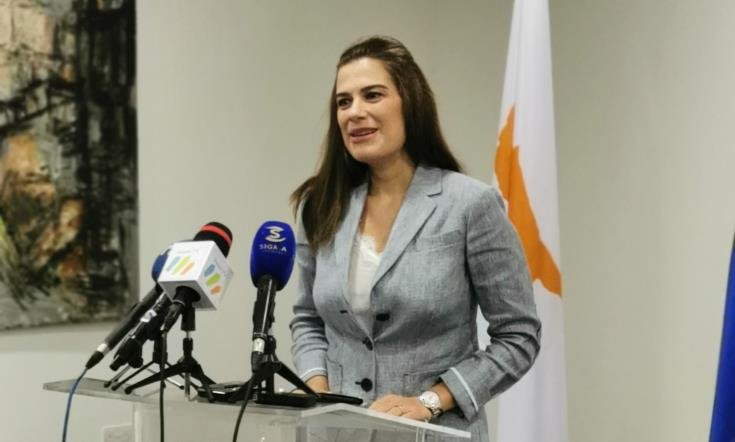The government said Monday it will use any safeguards afforded to it in the contract governing the LNG import terminal, sounding an upbeat note that any differences with the contractor would get ironed out.
Energy minister Natasa Pilides was taking reporters’ questions following a meeting with the head of main opposition party Akel, during which they discussed the delays plaguing the LNG import terminal project as well as the high price of electricity.
“There is no question of not utilising the capabilities given to us in the contract,” Pilides said.
Regarding the safeguards for the government in the contract, she expressed the hope that “there will some further improvements to the contract.”
Asked specifically about the extra monetary demands understood to have been put forth by the contractor, Pilides stated:
“The additional amount will be decided and determined by the Central Committee on Changes and Claims. Certainly the amount will not exceed 10 per cent of the total cost.”
The Central Committee on Changes and Claims is the top state organ that reviews changes and claims on public procurement contracts. Its members include the state treasurer, the director of the Public Works Department, and the director of the Department of Town Planning and Housing. The attorney-general and the auditor-general also participate, but only with observer status.
The LNG import project has run into serious difficulty. Initially set to be delivered by autumn 2022, the new – but only tentative – delivery deadline for it is mid-2023. For the delays, the contractor is said to be invoking the Covid situation and supply chain problems. The contractor is also understood to have demanded an extra €100 million for the increase in the price of raw materials (steel and so forth), but following talks with the government apparently agreed to lower the number to €25 million.
During a meeting at the palace last week, President Nicos Anastasiades urged all involved government departments to see how the project can be expedited and the problems resolved.
Present at that meeting was auditor-general Odysseas Michaelides, who later released a statement opining that the government should not cave in to the contractor’s demands, which might convey the message that it was malleable to being “blackmailed”.
The auditor-general believes that if the contractor does not meet its contractual obligations to the letter, the contract stipulates arbitration to resolve the dispute, rather than termination. Should the contractor insist that it is entitled to an extra amount and, if this is not justified, it would have to complete the project and then resort to arbitration.
Abandonment of the project, the auditor said, would instantly entail the contractor’s blacklisting across the European Union, damaging the reputation of the involved companies.
The Audit Office stressed that under no circumstances can it agree to the payment of any amount that is not justified “based solely on the argument that, unless the amount is paid, the contractor will abandon the project and chaos will ensue.”
Michaelides has taken flak for his rigid stance, especially from daily Politis who suggested that the pros of a compromise with the contractor far outweigh the cons.
The newspaper asked how the public interest would be served if the project got bogged down in endless arbitration, which could take years and with an unpredictable outcome.
It said also that the price of compromise (€25 million) pales in comparison to the benefit from delivery of the project – according to the government, €1.6 billion in revenue from the sale of natural gas for domestic electricity generation.
In addition, cancelling the contract and starting from scratch would not even guarantee finding any interested bidders. And meanwhile, Cyprus would keep paying millions each year in greenhouse gas allowances for its continued use of mazut in electricity.
In December 2019 Cyprus and a consortium led by China Petroleum Pipeline Engineering Co Ltd signed a contract for the construction of the nearly €300 million infrastructure for the import of LNG for electricity generation.
The LNG terminal will include a floating storage and regasification unit (Fsru), a jetty for mooring the Fsru, a jetty-borne gas pipeline and related infrastructure.
But sources have told the Cyprus Mail that neither the project owner (Etyfa, the subsidiary of Defa, the natural gas public company), nor their advisors Hill International, nor even the contractor China Petroleum are up to the task of managing an LNG project of this scale or complexity.
The sources say that, 16 months into a 24-month contract timeline, progress in the project is at best at 4 per cent.







Click here to change your cookie preferences